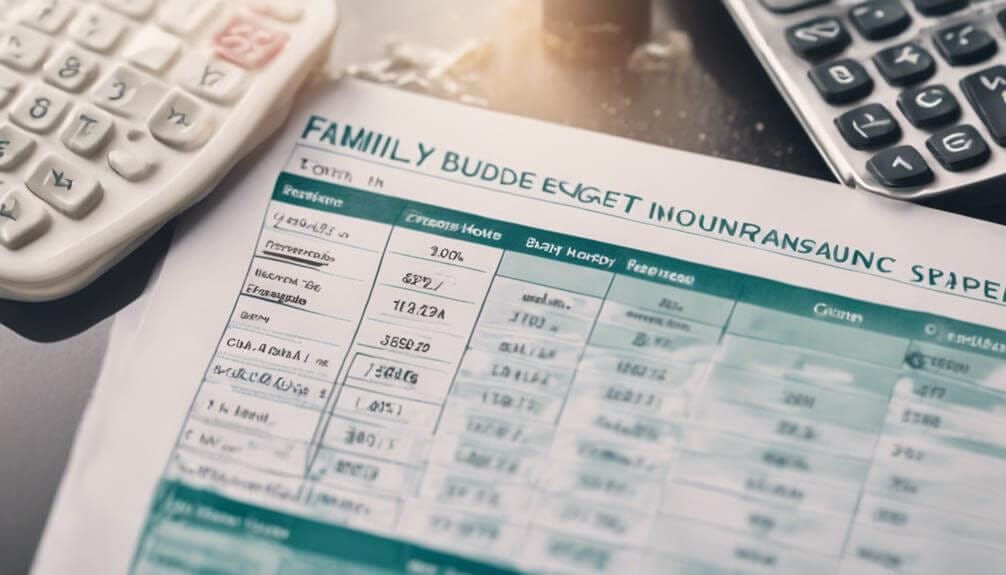When buying a home in the Bay Area, be prepared for high housing costs and fierce rental competition. Consider property taxes, utility expenses, and transportation costs that can impact your budget. Health insurance and savings planning are essential for financial stability. Explore cultural offerings but focus on the essentials first. Addressing these considerations will help you navigate the Bay Area's costly living conditions.
Key Takeaways
- High home prices impact affordability for homebuyers.
- Property taxes in California can be deducted from federal income taxes.
- Utility costs management is crucial for budget planning.
- Transportation expenses in the Bay Area can be significant.
- Health insurance and retirement planning are essential for financial stability.
Housing Market Trends

When considering the cost of living in the Bay Area, understanding the current housing market trends is essential. The homeownership rates in the Bay Area have been declining due to soaring prices, making it challenging for many individuals to afford homes.
Affordability has become a significant concern, with the median home price far exceeding the national average. This has led to a shift towards a more competitive rental market, where demand is high, and supply struggles to keep up. The rental market faces its own set of challenges, with limited housing supply exacerbating the issue.
As a result, rental prices have also surged, making it difficult for residents to find affordable housing options. In this dynamic environment, prospective homebuyers and renters need to carefully navigate the market, considering factors like housing supply, affordability, and fluctuating homeownership rates to make informed decisions that align with their financial capabilities.
Property Taxes

Considering property taxes in the Bay Area? Property taxes in this region are an important factor to keep in mind when purchasing a home. The amount you pay is based on the assessment value of your property. Understanding how this value is determined can help you plan for potential tax increases.
One benefit to note is that property taxes in California can be deducted from your federal income taxes. This tax deduction can help offset some of the costs associated with homeownership. Be sure to consult with a tax professional to understand how this deduction may apply to your specific situation.
It's essential to stay informed about any changes in property tax rates or assessment values in the Bay Area. Keeping track of these updates can help you budget more effectively and avoid any surprises when tax season arrives. By staying proactive and understanding the tax implications of homeownership, you can make more informed decisions when purchasing a property in the Bay Area.
Utility Costs

Understanding the impact of utility costs on your monthly expenses is essential when evaluating the overall cost of living in the Bay Area. To manage these costs efficiently, consider the energy efficiency of your future home and include utility expenses in your budget planning.
| Utility Type | Average Monthly Cost | Tips for Savings |
|---|---|---|
| Electricity | $150 | Use LED bulbs & energy-efficient appliances |
| Water | $75 | Fix leaks promptly & install low-flow fixtures |
| Gas | $50 | Properly insulate your home & adjust thermostat |
To reduce your utility expenses, focus on energy-efficient practices such as using LED bulbs, energy-efficient appliances, fixing leaks promptly, installing low-flow fixtures, proper home insulation, adjusting the thermostat, and being mindful of your water and electricity consumption. By incorporating these practices into your daily routine and considering the energy efficiency of your future home, you can effectively manage your utility costs and stay within your budget.
Transportation Expenses

To manage your budget effectively in the Bay Area, consider the impact of transportation expenses on your monthly costs. When deciding on a place to live, take into account the commuting distance to work or other frequently visited locations. A shorter commute can save you money on gas and reduce wear and tear on your vehicle if you choose car ownership. Additionally, explore the public transportation options available in the area. Opting for public transit can help cut down on gas expenses and potentially eliminate the need for a car altogether.
Gas prices in the Bay Area tend to be higher than the national average, so keeping an eye on fuel costs is essential when budgeting for transportation. By using public transportation or carpooling, you can mitigate the impact of these prices on your monthly expenses. Ultimately, making informed decisions about transportation can have a significant impact on your overall cost of living in the Bay Area.
Health Insurance Premiums

Taking into account your monthly budget, navigating the terrain of health insurance premiums in the Bay Area can greatly impact your cost of living. When it comes to health insurance, many factors play a role in determining the premiums you pay. If you're employed, exploring your employer benefits for healthcare coverage can be a cost-effective option. Many employers in the Bay Area offer extensive health insurance packages as part of their benefits package, which can help reduce your out-of-pocket expenses.
For those who are self-employed or don't have access to employer-sponsored plans, government subsidies and marketplace options are available. Through the Affordable Care Act, individuals can qualify for subsidies based on their income level, making health insurance more affordable. Additionally, the California health insurance marketplace provides a range of plans with varying premiums and coverage options to suit different needs.
Navigating the health insurance landscape in the Bay Area requires careful consideration of your specific circumstances and needs to make sure you're adequately covered while also managing your cost of living effectively.
Education Costs

Education costs in the Bay Area can vary considerably depending on the institution and program you choose. When considering furthering your education, keep in mind the following key points:
- College Tuition: Tuition fees for colleges and universities in the Bay Area can range from moderate to high, depending on the institution's prestige and program offerings.
- School Fees: In addition to tuition, schools often charge various fees for services, facilities, and extracurricular activities, which can have a substantial impact on the overall cost of education.
- Financial Aid Opportunities: Investigate scholarships, grants, and work-study programs that can help offset the burden of high education costs in the Bay Area.
- Cost of Living Adjustment: Remember to account for the higher cost of living in the Bay Area when budgeting for education, as this can affect your overall financial planning.
Groceries and Dining Out

When budgeting for groceries and dining out in the Bay Area, be mindful of the varying costs and dining options available to you. Meal prep can be a great way to save money on food expenses, allowing you to buy ingredients in bulk and prepare meals at home. Additionally, exploring local farmers markets can provide you with fresh produce at potentially lower prices compared to grocery stores.
Dining out in the Bay Area ranges from affordable eateries to high-end restaurants, so it's crucial to set a budget and choose dining options that align with your financial goals. While dining out can be a delightful experience, it can also quickly add up, impacting your overall cost of living in the area.
Entertainment and Recreation

Exploring entertainment and recreational activities in the Bay Area can offer diverse options to enjoy your free time and immerse yourself in the vibrant cultural scene of the region. Whether you're into outdoor activities or prefer attending cultural events, the Bay Area has something for everyone.
- Hiking and Biking Trails: Discover scenic trails like the Lands End Trail in San Francisco or the Redwood Regional Park in Oakland for an invigorating outdoor experience.
- Beach Days: Enjoy the sun and surf at popular spots like Baker Beach or Santa Cruz Beach Boardwalk.
- Museums and Art Galleries: Immerse yourself in the rich cultural heritage of the Bay Area by visiting renowned institutions such as the San Francisco Museum of Modern Art or the Oakland Museum of California.
- Music and Festivals: Experience the lively music scene and diverse cultural festivals that take place throughout the year, such as the Outside Lands Music Festival or the San Francisco Jazz Festival.
With so many entertainment and recreational options available, you'll always find something exciting to do in the Bay Area.
Savings and Emergency Fund

Consider prioritizing building your savings and emergency fund to ensure financial stability and peace of mind in the unpredictable Bay Area. Having a robust emergency fund can provide a safety net in case of unexpected expenses, job loss, or medical emergencies. It's advisable to have at least three to six months' worth of living expenses saved up for such situations.
In addition to saving for emergencies, it's crucial to focus on retirement planning. The Bay Area's high cost of living emphasizes the significance of starting early and exploring various investment options to build a secure financial future. Seeking advice from financial planners or utilizing online resources can help you navigate retirement savings effectively.
Improving your financial literacy and implementing budgeting strategies can also contribute to your long-term financial well-being. Understanding where your money is going and making informed decisions about saving and spending can help you reach your financial goals faster. Take advantage of workshops, online courses, or personal finance apps to enhance your financial knowledge and make sound financial choices.
Frequently Asked Questions
How Does the Cost of Living in the Bay Area Compare to Other Major Cities in the United States?
When you compare the cost of living in the Bay Area to other major cities in the U.S., you'll find that housing affordability is a challenge. However, job opportunities are abundant, and the quality of life is generally high.
Are There Any Upcoming Developments or Projects in the Bay Area That Could Impact Housing Prices in the Future?
So, you're wondering about the future housing scene in the Bay Area, huh? Well, brace yourself because tech expansions, transportation upgrades, and urban planning projects are gearing up to play musical chairs with housing prices!
What Are the Average Commute Times for Residents in Different Areas of the Bay Area?
On average, residents in different areas of the Bay Area experience varied commute times due to traffic congestion. It's important to take into account these factors when deciding where to live to guarantee a smoother daily journey.
How Do Housing Prices in the Bay Area Vary Depending on Proximity to Public Transportation Options?
Imagine the convenience of stepping out your door and hopping on a train or bus. Transit accessibility can impact housing affordability. In the Bay Area, proximity to public transportation often correlates with higher housing prices.
Are There Any Specific Neighborhoods or Communities in the Bay Area That Are Known for Having More Affordable Housing Options?
When looking for affordable neighborhoods in the Bay Area, you'll find housing trends pointing to areas like East Oakland, Richmond, and San Leandro. These communities offer more budget-friendly options compared to other parts of the region.
Conclusion
So, as you can observe, living costs in the Bay Area can be a bit on the higher side. But hey, it's all part of the charm of living in such a vibrant and bustling region!
Just remember to budget wisely and plan ahead to make certain you can enjoy all the amazing opportunities this area has to offer without breaking the bank.
Happy house hunting!



















